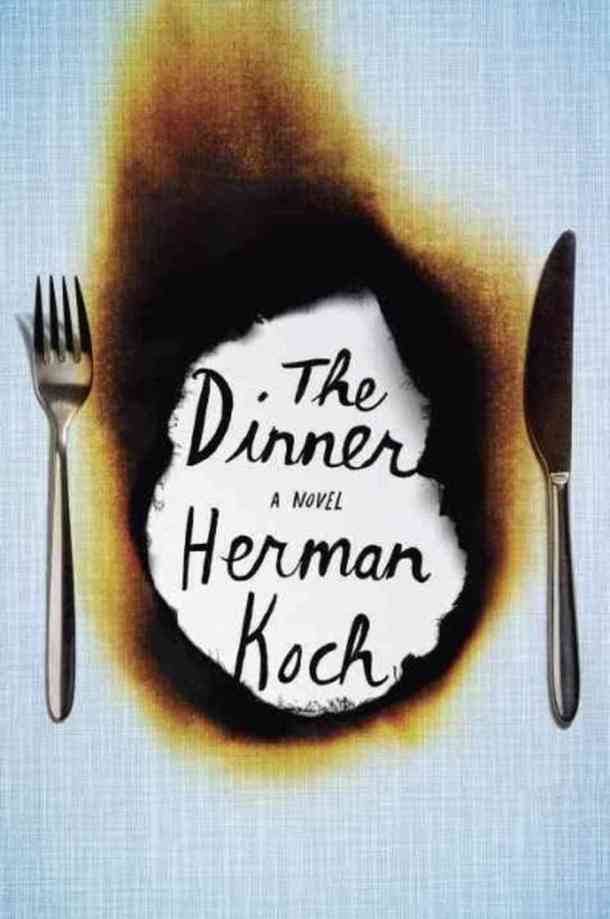About a year ago, while making excuses for laying aside The Girl with the Dragon Tattoo after only about 40 pages or so, I discussed how much I dislike reading books in translation. The loss of the original text and the substitution of a new one waters down the author’s unique voice, destroys the direct sense of mind-to-mind connection that even mediocre novels can provide, and inflicts on the reader the voice of a translator who probably isn’t as good a writer as the one that he’s translating, else he’d be writing great novels of his own.
Herman Koch’s The Dinner, translated from the Dutch by Sam Garrett, proves how wrong I was. I don’t know what the author’s original voice was like, but I don’t care. Garrett has done such a fine job of rendering the book into English that it really doesn’t matter whether it’s Koch’s mind, Garrett’s mind or a combination of the two that I’m connecting with. The book’s prose is seamlessly readable and I find it hard to imagine that it could have been significantly better in the original Dutch. It reads as smoothly and as intelligently as any well-crafted English-language novel I’ve read in recent years — better so than most — and that’s certainly good enough for me.
My friend George, who brought the book to my attention a few weeks ago when he praised it on a Web forum I frequent, said that the book has been compared to Gillian Flynn’s Gone Girl, and I can see why. It has the same acerbic, observational wit, the sense of seeing the world through the eyes of someone who notices telling details about the way we live, details that ring with ironic and often caustic truth. Also like Gone Girl, it has a major plot revelation about halfway through, but it’s not the kind that snaps your head around and causes you to rethink everything that’s come before, as Flynn’s was. In fact, Koch prepares you so thoroughly for the revelation that it doesn’t even come as a surprise and certainly doesn’t qualify as a plot twist.
What Koch does is something much subtler. I suspect that there will be, and probably have been, reviewers who will describe the novel’s first-person protagonist as an unreliable narrator, but he really isn’t. Nothing he tells you is misleading and when he omits information — as he frequently does — he tells you that he’s omitting it and assures you that he’ll fill in the details later — as he also does. What Koch does instead is to take advantage of the reader’s automatic tendency to sympathize with a first-person narrator and gradually, so slowly that you almost don’t notice that he’s doing it, subverts that expectation. I finished the book almost unsure of what I had just read or what any of it meant and when it finally came over me I realized that I was almost reluctant to accept it. Not to give too much away, but in the end the novel amounts to a major political statement — something that sounds quite boring but isn’t in the slightest — that addresses an issue that I find myself pondering during every major election: Why do people vote for things that are almost inhumanly cruel and harsh and then assume that these things don’t — and shouldn’t — apply to themselves?
What happens in the course of the book is that Koch alters your initial perceptions of the characters until you gradually realize that they are precisely the opposite of the people you thought they were in the beginning and that the character you most disdained throughout the majority of the novel is in fact the only person at the table — as its title implies, the novel takes place during the course of a single dinner — who is worth giving a damn about, the only one who isn’t a hypocrite and certainly the only one who has something resembling a conscience. And Koch does this so scrupulously that he never at any point betrays the reader’s trust in the integrity of his storytelling.
But while it is these gradual realizations that make the novel great, it is the witty, sharply observed prose and vividly drawn characters, as well as the way Koch draws out his revelations while always letting you know that they’re coming, that make it readable, even riveting, from the very beginning. If anything was lost in the book’s transition from Holland to America, it probably wasn’t worth having in the first place.
